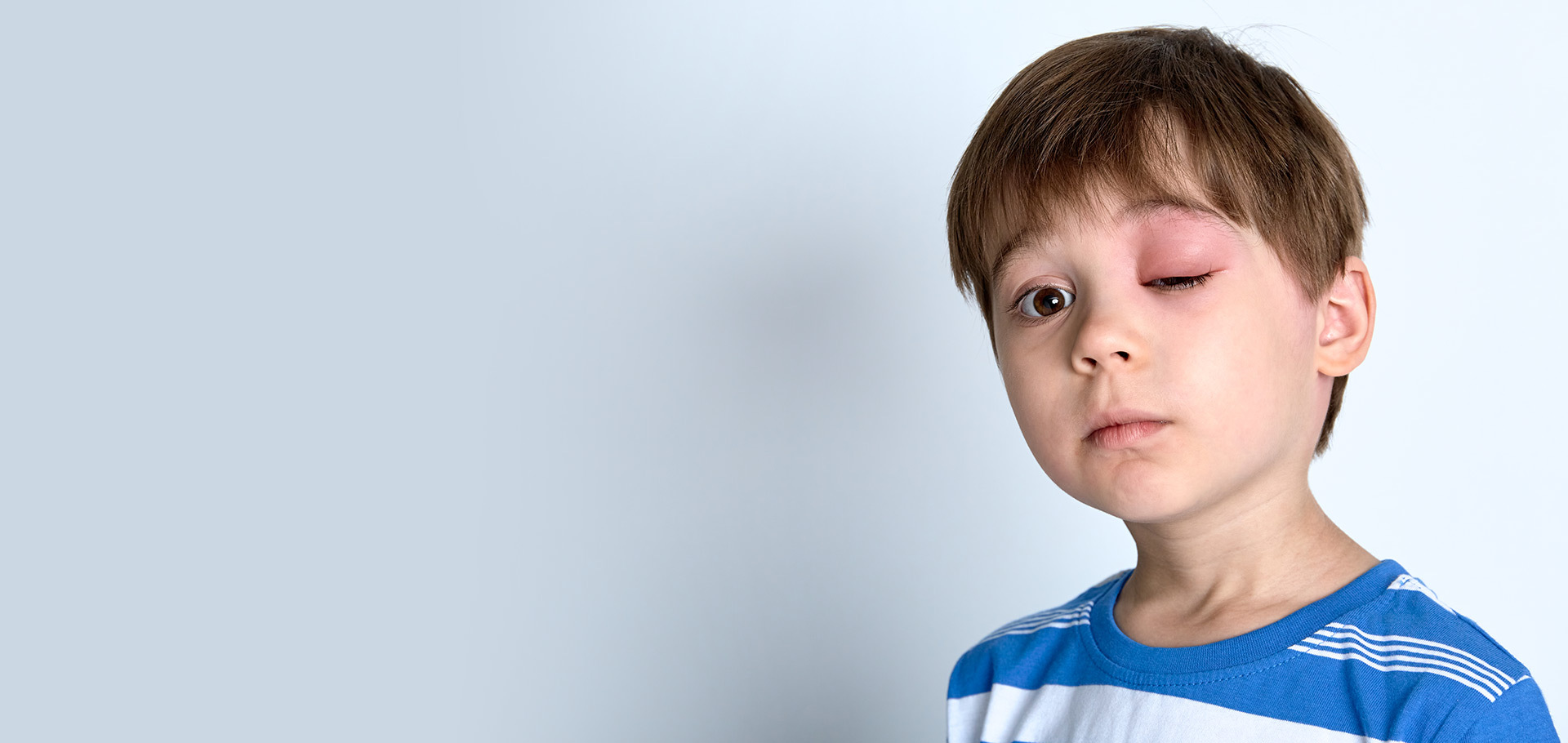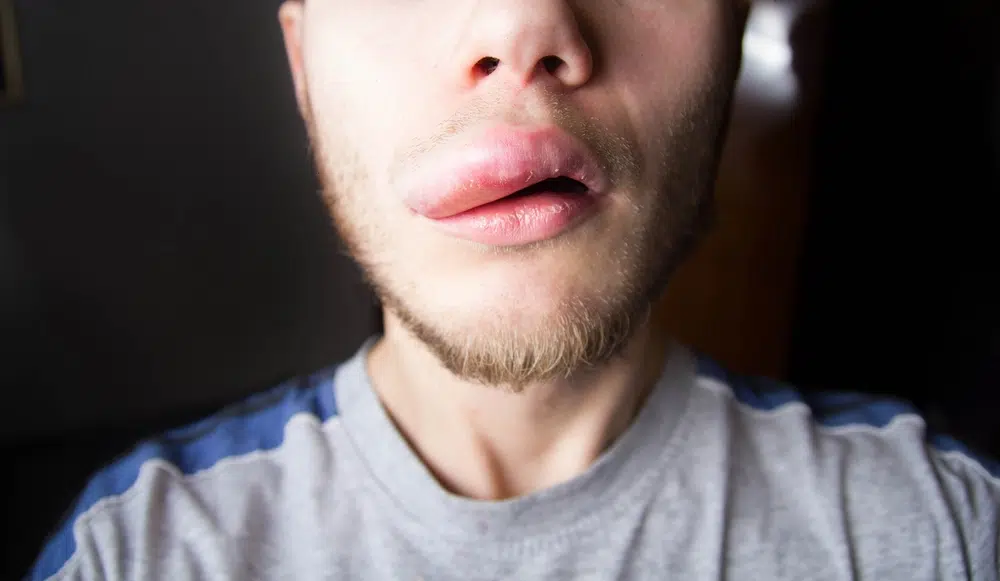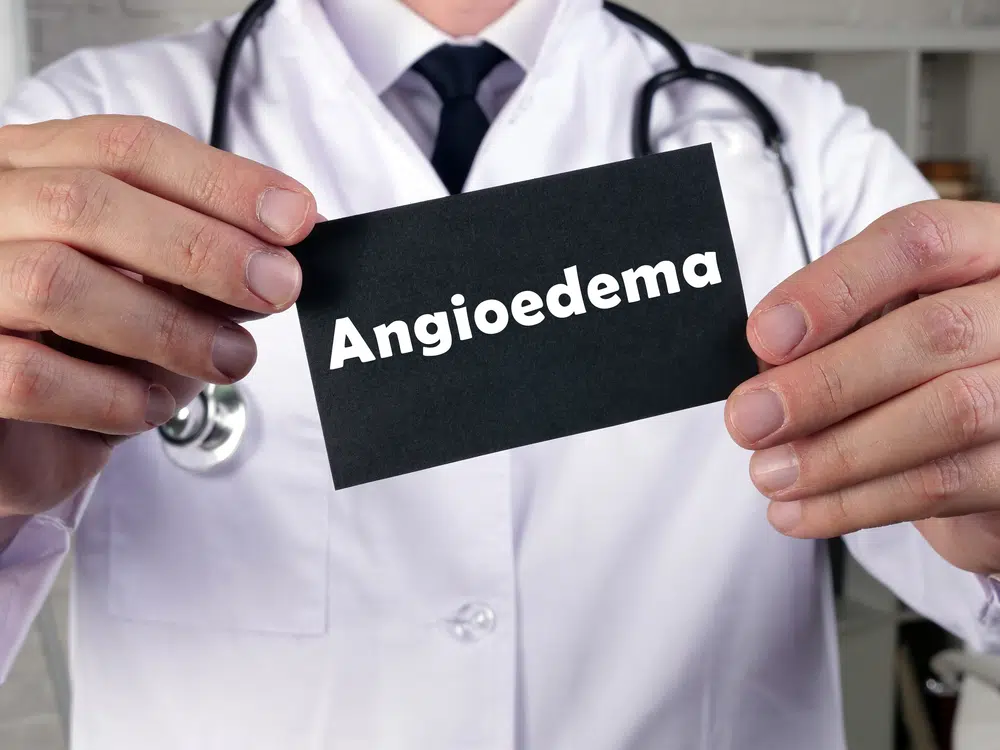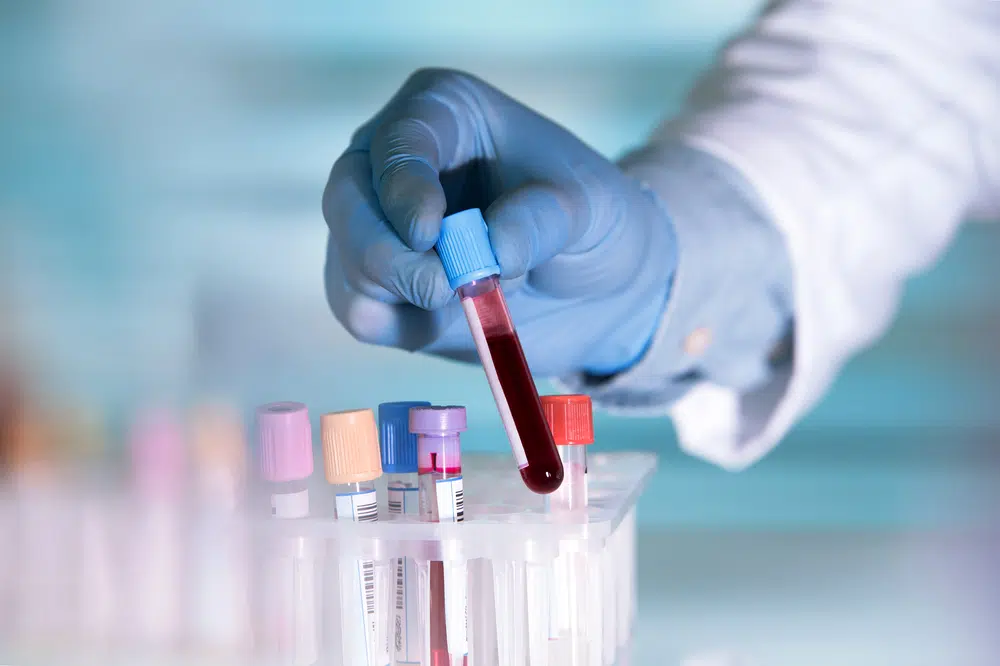
Angioedema Treatment
Battling persistent angioedema symptoms? It’s time for a change. Choose Penn Medicine Becker ENT & Allergy, where our expert allergist physicians guide you.
What is Angioedema and What Causes it?
Angioedema is a condition characterized by the swelling of the deeper layers of skin due to fluid build-up. This swelling often appears around the eyes, lips, genitals, hands, and feet, but it can affect any body part. Many people who suffer from angioedema also experience hives or urticaria, which presents as a raised itchy rash. The cause of angioedema can vary and can include abdominal pain, insect bites or stings, and certain medications or food allergies. In some cases, there may be no known trigger. Blood tests are usually required to help make a diagnosis as well as to rule out other conditions that may mimic angioedema symptoms, such as acute urticaria or an autoimmune disorder.
Angioedema is classified into two types: acute and recurrent angioedema. Acute attacks are generally mild symptoms that resolve within twenty-four hours without treatment; however, if left untreated they can become serious medical emergencies, especially if the throat swells shut, making it difficult to breathe. Recurrent Angioedema, on the other hand, is defined as having at least three episodes more than six weeks apart within one year with no known trigger.

Treatment for both types of angioedema will depend on the cause; however, emergency medical attention should be sought if you experience any severe symptoms, such as difficulty breathing or severe abdominal pain. Your healthcare provider will take your medical history, including any family history of allergies, and perform a physical examination along with possible blood tests in order to make a diagnosis and develop an individualized treatment plan for you.
Angioedema Treatment Medications
The appropriate therapeutic approach for angioedema is contingent upon the specific types and severity levels of the condition. The following is a comprehensive list of the commonly prescribed medications used to effectively alleviate symptoms of angioedema.
Histamine H1 Antagonist Medications
These drugs, commonly referred to as antihistamines, serve as a primary treatment for both allergic and idiopathic angioedema. Their function is to counteract the effects of histamine, a compound that the body releases during an allergic reaction, which triggers inflammation and swelling. This is why antihistamines are typically the first course of action when treating allergic angioedema.
Glucocorticosteroid Medications
Glucocorticosteroids, or corticosteroids, are anti-inflammatory medications that can help reduce swelling and inflammation in cases of allergic and idiopathic angioedema. These medications work by binding to specific receptors in cells that are signaling molecules to contribute to inflammation and swelling. By reducing the production of these molecules, corticosteroids can effectively reduce the inflammation and swelling associated with angioedema.
Kinetin
Kinetin is a plant hormone that has been shown to have the potential for treating hereditary angioedema by increasing the production of the C1-inhibitor protein.
Biologics
Biologic medications, such as monoclonal antibodies, can be used to treat certain types of angioedema by targeting specific proteins or cells involved in the inflammatory response.
Androgenic Steroids
Androgenic steroids are synthetic derivatives of the male hormone testosterone and can be used to treat hereditary angioedema. These medications (such as danazol) will increase the production of a protein called C1-inhibitor, which helps control inflammation and swelling.
ACE Inhibitors
Angiotensin-converting enzyme (ACE) inhibitors are medications used to treat high blood pressure, but they can also cause drug-induced angioedema. In such cases, referred to as ACEi-induced angioedema, alternative medications may be prescribed to manage the condition.
C1-Inhibitor Concentrates
A deficiency or dysfunction of the C1-inhibitor can lead to excessive release of inflammatory mediators. C1-Inhibitor Concentrates are used to treat hereditary angioedema by replacing the missing or dysfunctional C1-inhibitor protein in the body.
Xolair
Xolair (omalizumab) is an anti-IgE medication used to treat chronic idiopathic angioedema and allergic angioedema that is not responsive to other treatments.
Omalizumab
Omalizumab is a monoclonal antibody medication that can be used to treat chronic idiopathic angioedema by blocking the action of immunoglobulin E (IgE), a protein involved in allergic reactions.
Danazol
Danazol is an androgenic steroid medication used to treat hereditary angioedema by increasing the production of C1-inhibitor protein. In individuals with hereditary angioedema, there is a deficiency or dysfunction in the C1-inhibitor protein, which leads to recurrent attacks of angioedema.
Biologics or Anti-IgE Immunotherapy
Biologic medications or immunotherapy target specific proteins or cells involved in the inflammatory response and can help manage angioedema symptoms. Biologic medications may offer advantages over other therapies for angioedema, such as corticosteroids or antihistamines, due to their specificity and targeted ability.
Choosing the Right Doctor for Angioedema Care

When choosing a doctor to treat angioedema, it is important to find someone who has experience in dealing with the condition. You should seek out a healthcare provider or specialist who is knowledgeable about the common types of angioedema and can provide adequate treatment for your specific case. For severe cases, such as throat swelling or chronic urticaria, it may be beneficial to consult with an allergist or plastic surgeon that specializes in treating angioedema.
It is also important to have a plan of action in place for acute treatment of angioedema when needed. The best healthcare provider for you should be able to provide guidance on medications and lifestyle changes that can help reduce symptoms and manage the condition over time. Additionally, they should also be able to provide support and resources that can help you better understand your condition and learn how best to manage it over time.
Diagnostic Tests to Check for Angioedema Symptoms
For those suffering from severe angioedema, a healthcare provider may be able to diagnose the condition based on a physical exam and a review of symptoms. If an inhibitor deficiency is suspected, laboratory tests may be ordered to confirm the diagnosis. These tests can include checking for levels of C1-inhibitor protein in the blood, as well as screening for any underlying genetic conditions that could be causing angioedema. If an allergic reaction or anaphylactic reaction is suspected, allergy testing or referral to an allergy specialist may be necessary. Ultimately, a plastic surgeon who specializes in treating angioedema can help with diagnosing and managing this condition.

Lifestyle Changes to Prevent Future Angioedema Attacks
Preventing future angioedema attacks involves identifying and avoiding triggers, as well as making certain lifestyle changes. These may include:
- Avoiding known allergens or irritants
- Managing stress through relaxation techniques, such as meditation or yoga
- Eating a healthy diet
- Prioritizing sleep and self-care
- Quitting smoking and limiting alcohol consumption
- Following your healthcare provider’s recommendations for preventive medications and other treatments
- Having an emergency plan in case of severe attacks
Schedule your consultation
Why Choose Our Specialists?
- Dr. Elias Akl, is a distinguished allergist and immunologist based in Philadelphia. He holds board certifications in Allergy and Immunology as well as Internal Medicine, showcasing his expertise in multiple medical disciplines. Dr. Akl is not only board-certified in internal medicine but also a Fellow of the American Academy of Allergy Asthma and Immunology (FAAAAI).
- Dr. Kathryn Edwards, Director of Allergy & Immunology at The Penn Medicine Becker ENT & Allergy Center, is a board-certified allergist and immunologist who specializes in the diagnosis and treatment of allergies, food allergies, skin conditions, and asthma. She is a highly trained physician with extensive experience in the military, where she served as a pediatrician and chief of Allergy/Immunology. Dr. Edwards provides care for patients of all ages, from neonates to geriatrics.
- Dr. Naba Sharif is a highly skilled board-certified Allergist and Immunologist with expertise in diagnosing and treating allergies, including environmental and seasonal allergies, food allergies, and asthma. She received her medical degree from SUNY at Stony Brook School of Medicine, completed a Pediatrics residency at Hasbro Children’s Hospital of Brown University, and pursued a fellowship in Allergy and Immunology at the North Shore-Long Island Jewish Health System. She practiced as a Pediatrician and Allergist-Immunologist at Kaiser Permanente in Washington DC, was recognized as a Top Doctor by Washingtonian Magazine from 2016 to 2020, and is a Fellow of the American Academy of Allergy, Asthma & Immunology and the American College of Allergy, Asthma & Immunology. Dr. Sharif is committed to community service, health education, empowerment, and advocacy for the underprivileged.
- Dr. Jamie Zacharias is a highly accomplished and board-certified Allergist and Immunologist hailing from South Jersey. She pursued her education in her hometown, graduating from Bishop Eustace Preparatory School, and furthered her academic journey by earning her bachelor’s and medical degrees from Drexel University and the College of Medicine in Philadelphia, PA. Dr. Zacharias continued her medical training with an Internal Medicine internship and residency at Drexel University College of Medicine/Hahnemann University Hospital. Following this, she completed a comprehensive Allergy and Immunology fellowship at Penn State Hershey Medical Center, where she actively engaged in asthma research, particularly focusing on patient demographics and phenotyping. Dr. Zacharias holds memberships in esteemed organizations such as the Pennsylvania Allergy and Asthma Association, the American Academy of Allergy, Asthma, and Immunology, and the American College of Allergy, Asthma, and Immunology. Her specialization encompasses the diagnosis and treatment of various conditions, including asthma, immunodeficiencies, seasonal and environmental allergies, allergic reactions (including drug and food allergies), and skin conditions such as hives and eczema. Dr. Zacharias is dedicated to providing care across a wide age spectrum, from pediatric to geriatric patients, and she is excited to contribute to the well-being of her community where she has deep roots.

Pick one of our convenient locations
for your Angioedema Treatment
